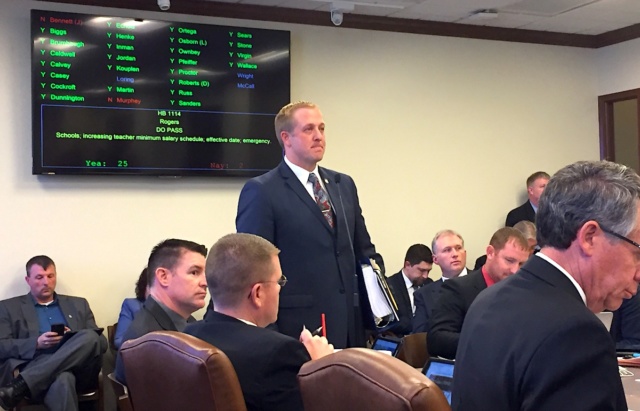

The leading proposal to increase Oklahoma teachers’ salaries passed the House Appropriations and Budget Committee this afternoon by a vote of 26-2, despite 20 minutes of questions about how the Legislature will find state revenue to fund the initiative.
“For us to recruit and retain highly qualified teachers, it starts with the salary,” said Rep. Michael Rogers (R-Broken Arrow), who has authored the proposal. “It’s a multi-year approach on a teacher pay raise.”
HB 1114 by Rogers would stair-step a $6,000 raise in the minimum teacher salary over three years. The 2017-2018 fiscal year would see a $1,000 increase, the next year would see a $2,000 increase and the third year would see an additional $3,000 increase.
But committee members asked how Rogers can guarantee money will be available to fund three years’ worth of teacher pay raises.
“My concern is how we’re going to pay for it,” said Rep. John Bennett (R-Sallisaw). “If the bill passes and we don’t have a way to pay for it, how is that going to look for the districts?”
Rogers told Bennett — and a line of Democrats who pressed him on the same topic — that the districts would not be given an “unfunded mandate” for teacher raises.
“We’re not going to move this forward and pass this into law if we don’t have a way to pay for it,” Rogers said. “At the end of the day, we can build this into our budget, and we can pass it. To say that this would be an unfunded mandate would be inaccurate.”
The concept of an “unfunded mandate” had been raised moments earlier owing to HB 1115 by Rep. Avery Frix (R-Muskogee). That bill would prohibit the Legislature from creating new mandates or amending existing mandates “unless sufficient funding is appropriated by the Legislature or another source of funding is otherwise provided for to pay the cost of the mandate.”
Frix’s bill passed the committee 24-0 despite Frix’s uncertainty about various hypotheticals that his colleagues posed to him Monday and the week prior in subcommittee.
House Minority Leader Scott Inman (D-Del City) asked Frix on Monday whether bills that include the language “when funds are available” would count as mandates. Frix attempted to defer to House staff for interpretation, though the issue remained unclear.
But Inman carried the issue forward to Rogers’ teacher pay bill.
“Is it not giving teachers false hope to do it this way?” Inman asked before suggesting the bill could wait until legislative leaders strike an agreement in the Joint Committee on Appropriations and Budget more than a month from now. “The likelihood of it becoming law is slim to none.”
Rogers countered.
“I would disagree with you. I would think the likelihood is higher,” he said.
Inman pressed further, asking why Rogers and other Republicans — who have been meeting on the topic of teacher pay since the end of last session — have not found a revenue-raising measure on which they could guarantee 51 GOP House votes.
“It’s your job to govern,” Inman said. “It’s our job to help. But it’s your job to govern.”
Rogers conveyed the difficulties of herding cats.
“Getting a large caucus like ours all on board is tough,” he said. “You know that. We could name off members right now who will never vote for a tax increase, no matter what it is.”
In the end, Bennett and Rep. Jason Murphey (R-Guthrie) were the only members to vote against Rogers’ pay proposal. Bennett noted in questioning that he believes teachers deserve a raise, though he expressed concern about the ability for it to happen budgetarily.
After his bill passed, Rogers said outside the committee room that “most people” in Oklahoma want to see a teacher pay raise for their schools, and he argued that moving the bill forward should offer important momentum on the topic.
“Sometimes you’ve got to walk out on a ledge,” Rogers said. “It forces us to make some tough decisions and push this forward.”
HB 1114 and HB 1115 will now head to the full House of Representatives for consideration.
Follow NonDoc:
